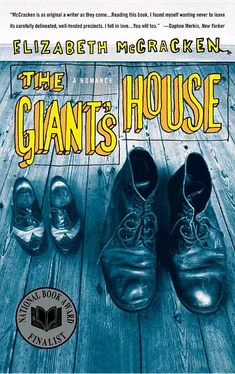“It’s cold out,” said Mrs. Sweatt to me, “and bourbon’s better than vodka, you’re right.” She took one dainty sip from her glass. “I used to be quite a drinker, when I was younger. Teenager. Sweet drinks.”
“This was where?” I held the glass beneath my nose. I was not a drinker at all. The smell was incredible. I knew from my college experiences that I’d have to down it all at once — the first sip would put me off.
“Davenport. Iowa. Bix Beiderbecke was from there, too. That’s about it.”
“Who?”
“ Who? Bix! Really? You don’t know him? Something I know and you don’t. He was a cornet player. Famous one. Before my time, but his family still lived there. Everyone felt sorry for the Beiderbeckes. Drink your whiskey. We should get back.”
“I will. Why did they feel sorry?”
“Well, their son . A jazz musician. And he was a drug addict, too. I think that’s what killed him; he died young, anyhow. Everyone felt so sorry for the Beiderbeckes. Like they feel sorry for me in Brewsterville.”
“They don’t—”
“They do,” she said. She’d finished her whiskey in small furtive sips.
“Have another,” I said. “This is all I’m having.”
“Maybe I will.” She looked appealingly at the bartender, who brought her a second. “No,” she said. “They do. And it’s just like with the Beiderbeckes. Bix was the most important thing to ever happen to Davenport. And Jim will be the most important thing to happen to Brewsterville. I’m not just saying that because I’m his mother. He’ll be famous.”
“I think so,” I said. “A famous lawyer, maybe.”
She looked at me as if I were the stupidest person in the world. “Oh, I’m not talking about what he’ll do . I’m talking about him. He’ll be the tallest man ever, that’s why he’ll be famous.”
“He’s young,” I said. “He won’t grow forever.”
“You’ll see,” she said. “Drink.”
I didn’t want to. I investigated my glass, trying to seem thoughtful. “But your husband,” I said. “He wasn’t from Iowa.”
She wrinkled her nose, then scratched it. Mrs. Sweatt was always itchy when questioned. “No. He was a Cape Cod boy. Cape Cod.” She sighed. “Ruined me.”
“The Cape or the boy?”
“Oh, I guess I can’t pin it on the Cape,” she said. “Drink your whiskey.”
“Okay.” I lifted the glass, paused, poured it in my mouth, and swallowed. I concentrated on whacking the empty glass on the bar, so I wouldn’t shudder.
Mrs. Sweatt smiled completely for the first time in my presence; I saw that one of her lower teeth was entirely silver. “Wow,” she said. She’d forgotten that in whiskey, as in many things, it’s the amateurs who have to be showy.
It wasn’t as cool as I’d expected outside; it had been the wind off the ocean that chilled us, and now we were a block inland. Mrs. Sweatt was back to her usual silence. I still could taste the whiskey on the edges of my tongue. I felt a trifle unbuckled.
From behind us, a voice said, with a conspicuous lack of French accent, “It’s les girls!”
I turned. Oscar, of course.
“Les Brewsterville girls! Where you been, girls?”
Mrs. Sweatt wore a distracted, wistful look on her face, like the girl singer of a big band during a tragic ballad’s instrumental solo.
“Walking,” I told Oscar. “Only walking.”

Even now, I remember Mrs. Sweatt as the embodiment of every sad love song ever written; she believed every musical statement of what love did to you when it went wrong, how it was like a poison without an antidote, how you’d never breathe right again. Most people feel that way only when the music plays; all her days, Mrs. Sweatt’s heart was tuned to some radio frequency crammed with tragedy. Even that night in Provincetown (sitting on the sea wall, walking to the bar, drinking whiskey) she sounded like she was singing her own sad, particular lyrics: Can’t blame it on Cape Cod, guess I’ll blame it on the boy .
To others, perhaps, Mrs. Sweatt and I seemed similar: two youngish single women in a town of married couples. People in town probably pitied our singularity. We were old to be unmarried, and odd, surely matchless. But here’s the difference: she was ruined by love — that’s how she put it — while I was ruined by the lack of it. And the fact is when you’re flooded with something, you’re more likely to rot away, to disappear entirely, than if you dry up slowly. Ask the Egyptians, ask anyone.
The Adventures of Rocket Bride
A month after that night in Provincetown, James brought me a folded piece of ruled paper.
“It’s from my aunt,” he said.
The handwriting said Peggy Cort on the outside of the fold. It was improbably fancy handwriting for the unfancy paper — brown ink and the practiced thick-then-thin cursive of someone who’d been brought up to write thank-you notes promptly.
Inside were the words dinner, friday, six pm, dessert if you’re willing .
All my life, dinner invitations moved me peculiarly. Dinner parties, like romance, always seemed to happen to someone else. I was a librarian approaching thirty, and people perhaps thought I was allergic.
I kept the catalog cards of withdrawn books for scrap at the desk. I picked one up to respond and glanced at the back. A home cyclopedia, encompassing health, nutrition, and child raising . That didn’t seem right. I sorted through the pile, hoping ridiculously I’d find one of the cards for that ruined copy of Tom Sawyer James had kept, but of course I’d pulled them years before. Some long-gone patron had already taken them, jotted down something less important on the back of the title card, the author card, the shelf list. I settled for A History of Rhode Island .
Dear Mrs. Strickland: Yes please , I wrote. And yes to dessert as well. P. Cort . I folded it in half. The printing on the front of the card left no room for me to write her name as she’d written mine, so I slipped my note in a library envelope.
Mrs. Sweatt met me at the door. Instead of saying hello, she plucked the bakery box from my hands by the length of string that held it shut, then turned from me, as if she were a servant taught not to interact with the guests. I hadn’t seen her at the library in the past few weeks, I realized, and in that short time she’d changed. Her face puffed out, as if she’d gained ten pounds only in her head; the rest of her looked bird-skinny.
“Hello,” I said. I tried to make it sound meaningful.
She sighed, and lifted that newly heavy head, and looked at me, and said, “I’ve been sick.”
Oscar Strickland was just behind Mrs. Sweatt; he shook my hand. “Hello, Miss Cort.” He, too, seemed strangely shy; I’d remembered him as a jocular man, even loud.
“Please call me Peggy,” I said.
Caroline came out of the kitchen, drying her hands on the back pockets of her jeans. “Why Peggy Cort,” she said. “How nice.”
“There’s cake,” said Mrs. Sweatt. She’d set the empty box on the table by the door and now peered into the little white cake that balanced on her upturned palms.
James did not have dinner with us; he was working on some homework at a friend’s. I wondered whether he spent a lot of time avoiding the grown-ups — I wanted to pin his absence on something other than my presence, since I’d secretly hoped that the invitation was his doing. Well, I thought: James’s house. I wanted to look at every object and invest it with him, to pick up a bottle off the plate rail that ran the edge of the dining room, unfold the quilt hanging off the back of a chair, saying, James? as if James were a relative so long missing I believed he’d somehow become the bottle, the quilt. But that was impossible. The knickknacks had clearly belonged to some significant but long-dead old lady; the furniture was mismatched and gummy with years of hasty polishings. Nothing reminded me of him. I sat at the dinner table in what I assumed was his chair.
Читать дальше













